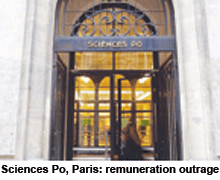Rumours swirled when France’s best-known university leader was found dead in a New York hotel room in April. Had Richard Descoings, director of the Paris Institute of Political Studies (known as Sciences Po), been alone when he died? commentators asked. Did the gay hook-up websites that the married 53-year-old had allegedly been trawling on his laptop provide any clues?
Although detectives refused to rule out foul play for weeks, their eventual conclusions were rather more prosaic: he had died of a heart attack, a coroner ruled, and there was no evidence to suggest that anyone else had been with him.
But six months on from his death, Descoings continues to attract controversy. The storm centres not on his death, however, but rather on his reign at one of France’s most prestigious universities and the question of who will succeed him.
 Under Descoings, Sciences Po was transformed. It has changed from a traditional grand établissement, which selected the best students from the best lycees to prepare them for a life in public administration, into a modern, internationally orientated higher education institution.
Under Descoings, Sciences Po was transformed. It has changed from a traditional grand établissement, which selected the best students from the best lycees to prepare them for a life in public administration, into a modern, internationally orientated higher education institution.
In 2001, it began to recruit many more students from France’s poorest neighbourhoods through the country’s first affirmative action policy. To do so, it interviewed candidates rather than selecting them via an entrance exam. Among other innovations, Sciences Po also began to require undergraduates to spend at least one year studying abroad. And since Descoings took over in 1996, the institution has doubled in size to about 10,000 students.
But the spotlight is now focused not on Sciences Po’s policies but rather on its administration — most notably on the generous remuneration awarded to Descoings and his executive committee.
Details of a report into Sciences Po by the Cour des comptes, a powerful government audit body, leaked to the French press have sparked outrage in some quarters. It was widely known that Descoings earned upwards of £250,000 (Rs.2.12 crore) a year — more than his close friend Nicolas Sarkozy, who was French president at the time — yet some reports suggest his remuneration was close to £350,000 a year if perks were included.
Other leaks from the report, which is due to be published by the end of the year, suggest that some practices at the institution, such as first-class air tickets for professors, pushed the limits. Comments Anne Corbett, visiting fellow at the London School of Economics’ European Institute: “There are concerns that he behaved like a monarch at Sciences Po, backed up by a tight circle of people around him. However, his legacy is undoubted. Sciences Po was once for the elite of France; he changed it into an inclusive and very successful international university with a network of campuses across the country.”
The furore has also been the first real test for Geneviève Fioraso, the country’s new higher education and research minister, who decreed that Sciences Po delay naming its new director until the audit commission delivers its report.
Intervention by the government is nothing new in French higher education, which is tightly controlled by the ministry of education in Paris. However, some commentators believe the minister’s interference in the selection process might signal a greater readiness to meddle in university affairs — which would be contrary to reforms enacted by Sarkozy in 2007 to increase institutional autonomy. “She is certainly making different noises about university autonomy compared with the previous government,” says a Sciences Po lecturer who asked to remain anonymous. Moreover there is some speculation that Fioraso might seek to reopen the four-man shortlist for the post to other candidates, or at least push Sciences Po’s governing body to appoint her preferred director.
Yet the affair — and the issues raised about university autonomy — has also caused some to wonder whether the higher education reforms initiated by Sarkozy will be continued by Hollande’s administration. The changes encouraged universities to merge or work more closely together in exchange for multimillion-euro investment in a drive to create more world-class universities.
Although firm policies have not been announced, Fioraso and Hollande have yet to come out definitively in favour of the plan to create a so-called Sorbonne League of elite universities, with other institutions perhaps left to scrape by on reduced funding.
(Excerpted and adapted from Times Higher Education)